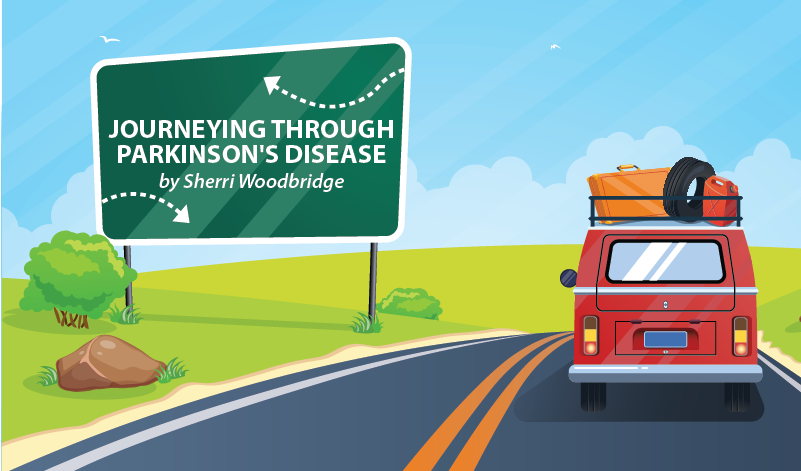Parkinson’s and the ‘D’ word
Written by |


Many people refuse to talk about it. Fewer want to admit they struggle with it. Many are embarrassed by it. All would choose to live without it.
It’s the “D” word: Depression.
On my first visit to see my neurologist several years ago, much to my surprise, I was asked if I struggled with depression. I answered no. My doctor proceeded to tell me that depression is one of the first signs of Parkinson’s disease. Today, if he were to ask me that, I’d have to say yes.
I’ve had several people in my life who are close to me who fight depression. It is a disease that leaves you feeling discouraged, hopeless, and even desperate. As many as 60% of people with Parkinson’s disease struggle with depression. Many will try to hide the fact that they have depression. They have bought into the lie that if others knew they were walking around underneath a black cloud, they would be rejected and thought of as weak, mentally unfit, and unable to handle the “little” thing we call life.
We’ve come to believe that if we are dealing with depression, something must be wrong with us mentally. We must be going crazy, for this thing called life is supposed to be lived happily ever after and not under a cloud of darkness.
I’d never struggled with depression until the past few years when I started thinking I was just tired. Parkinson’s disease can be so odd. Because of that, you question whether you have the correct diagnosis. You hear about one person’s journey and it sounds nothing like your own. I’ve heard PD labeled as a “designer” disease, meaning that it affects each person very individually.
We all wear this disease similarly and yet differently. One may shake from tremors and not have much else going on (though highly uncommon). One may deal with excruciating pain that is hidden and unseen. Another may struggle with many other aspects that can be caused by the disease: speech, swallowing, shaking, pain, depression, inability to smell, and more. Yes, it is definitely a designer disease.
I realized I was battling depression one morning when I didn’t feel like getting out of bed. I’ve heard that’s normal for someone who is depressed, but it wasn’t normal for me, especially on a day when one of my grandkids was expected to visit. Days with my grandkids are precious to me, but on this day, even that fact wasn’t helping me to get up and get going. However, there comes a point when reality gets in your face and drags you out of bed so that you can at least operate like a robot throughout your day.
As the day wore on, I thought about how hard it was for me to get out of bed that morning and asked myself, “What is your problem?” Then it hit me.
I have been working on a book about living with Parkinson’s and the fears we face because of it. Doing something like that makes you face the realities of the disease and the many and varied “what ifs.” It also can make you feel as if you’re going to become useless, worthless, and a burden to those you love, and who in their right mind wants to succumb to that?
Yes, that was how I began to feel, but when I recognized it for what it was, I was able to do something about it. I began telling myself the truth and quit listening to the lies. Yes, I may have Parkinson’s disease, but I am not useless. After all, who else feeds the cat and picks up after the dog? I am not worthless — just ask God. And a burden? Not yet. Hopefully not ever.
Sometimes on the dark and cloudy days when we allow those umbrellas to stay over our heads so that it becomes difficult to look up, we need to leave the umbrella inside the door and jump in the muddy puddles instead — change our surroundings. We need to let go of our pride and those lies, call a friend, and get out of the house. Isolation breeds depression, and if we’re spending a lot of time alone, it’s time to change the game plan.
If you’re feeling down in the dumps, do something constructive. Take up painting, scrapbooking, photography, writing, dog walking — things to get your mind off your feelings and onto something good and healthy. Helping others will help you, too.
If you are having a difficult time dealing with depression and have PD, talk to your neurologist about it. That’s what they’re there for, to make life a little easier in the midst of this disease. It’s nothing to be ashamed of, whether you have PD or not. It’s time to listen to the truth. After all, that is what sets us free.
***
Note: Parkinson’s News Today is strictly a news and information website about the disease. It does not provide medical advice, diagnosis or treatment. This content is not intended to be a substitute for professional medical advice, diagnosis, or treatment. Always seek the advice of your physician or another qualified health provider with any questions you may have regarding a medical condition. Never disregard professional medical advice or delay in seeking it because of something you have read on this website. The opinions expressed in this column are not those of Parkinson’s News Today or its parent company, Bionews Services, and are intended to spark discussion about issues pertaining to Parkinson’s disease.






Leave a comment
Fill in the required fields to post. Your email address will not be published.